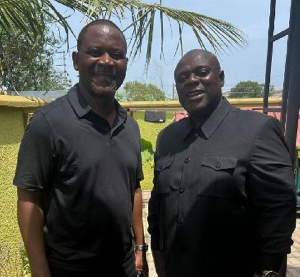- Home - News
- TWI News | TV
- Polls
- Year In Review
- News Archive
- Crime & Punishment
- Politics
- Regional
- Editorial
- Health
- Ghanaians Abroad
- Tabloid
- Africa
- Religion
- Election 2020
- Coronavirus
- News Videos | TV
- Photo Archives
- News Headlines
- Press Release
General News of Thursday, 6 March 2003
Source: gna
Assasie-Gyimah: I am likey to appear again
Naval Captain (rtd) Baafour Assasie-Gyimah, former National Security Co-ordinator, on Wednesday told the National Reconciliation Commission (NRC) that he was likely to come before it many times before it completed its job.
Assasie-Gyimah was on in the witness seat to give his side of a story in which Ex-Corporals Stanley Otchere Obeng and George Kojo had earlier mentioned him in their testimonies.
He denied ever torturing any junior officer and indicted that so far as people mentioned him in their testimonies, he would come to clear his name at the Commission.
Assasie-Gyimah's appearance on Wednesday was the second in his defence of three out of a number of cases in which he had been mentioned during the eight-week old public hearing of the Commission.
Obeng had said Assasie-Gyimah, who was on the floor of the Commission at the Old Parliament House, was the architect of his arrest on June 27, 1983 and torture on suspicion of plotting a coup. He said the Naval Captain had said Obeng had given orders for other soldiers to beat other people at Gondar Barracks.
Kojo said Assasie-Gyimah led a group of soldiers to arrest him at Aflao on suspicion of a coup plot, blindfolded and beat him and threatened him with death.
Assasie-Gyimah denied the charges and said he on several occasions saved Otchere from soldiers who were molesting him.
He also said he happened to be at Aflao for military intelligence work and joined Captain Lumor, the Officer Commanding and an army contingent that came there with the orders from the One Brigade Office to search and arrest some people.
Earlier in the day Mr Robert Kofi Kwakye former Chief Engineer of Ghana Highway Authority (GHA), told the Commission of being relieved of his post by a radio announcement after the 1979 military coup after being framed up by his juniors for misapplication of funds.
He said he has not been paid any compensation although he worked with the Ministry of Local Government and Rural Development for 10 years.
He said he applied to the Commission on Human Rights and Administration (CHRAJ, but was told that he worked with the GHA for only two years.
Entertainment









